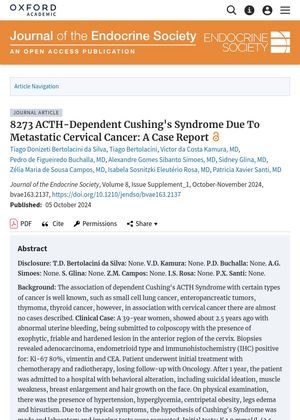ACTH-Dependent Cushing's Syndrome Due to Metastatic Cervical Cancer: A Case Report
October 2024
in “
Journal of the Endocrine Society
”

🚨 The case report mentions hirsutism, which is related to hair growth and can be influenced by hormones affecting hair, but the primary focus is on Cushing's syndrome and metastatic cervical cancer, not directly on hair or scalp health.
TLDR ACTH-dependent Cushing's syndrome linked to metastatic cervical cancer is rare and has high risks.
This case report describes a rare instance of ACTH-dependent Cushing's syndrome caused by metastatic cervical cancer in a 39-year-old woman. The patient initially presented with symptoms such as abnormal uterine bleeding and was diagnosed with endometrioid adenocarcinoma. After initial treatment, she developed symptoms consistent with Cushing's syndrome, including hypertension, hyperglycemia, and hirsutism. Laboratory tests confirmed elevated levels of ACTH and cortisol. Imaging revealed metastatic disease in the liver and enlarged adrenal glands. Despite treatment attempts with Etomidate and Ketoconazole, the patient underwent bilateral adrenalectomy but unfortunately died from septic shock shortly after surgery. This case highlights the diagnostic challenges and high morbidity and mortality associated with this rare condition, with fewer than 10 cases reported in the literature.





